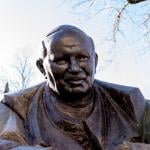ERIN ASKS:
Why are religion and ethnicity so closely linked? Why are they especially close in Judaism whereas in Christianity not so much?
THE GUY ANSWERS:
A few random observations. The Guy is no anthropologist or sociologist. But it’s obvious that the quest for transcendent religious meaning is virtually universal among humankind and till modern times was necessarily intertwined with ethnic identity on a tribal, regional, and even national basis. Thus to be Indian is essentially to be Hindu. Thus also for Christian branches through much of history. To be Spanish was to be Catholic, to be Russian was to be Orthodox, or to be Swedish was to be Lutheran Protestant. With easy transportation and massive emigration this pattern has faded. Active church commitment as part of ethnicity is weak in much of Europe even though once-dominant church bodies retain large nominal memberships thanks to indiscriminate “firehose baptism.”
In European times past, religious minorities were socially at the margins and oft persecuted. Ask any Quaker or Jehovah’s Witness. England even threw “nonconformist” (that is, non-Anglican) John Bunyan, author of “Pilgrim’s Progress,” into jail off and on for a dozen years. In 21st Century Islam an extreme example survives among certain hardliners who believe religious law regards conversion to another faith as no mere matter of conscience but treason against one’s own people that deserves state execution. In this version of Islam, religious identity transcends all ethnic lines.
The United States was the first and greatest exception to all that. “Free exercise” of faith with no “establishment of religion” was guaranteed by the Bill of Rights because no one denomination claimed majority support. Since then the nation has developed an amazing variety of creeds. The U.S. citizenry’s identity is not drawn from either shared religion or ethnicity, but only a shared heritage of political concepts, moral values, culture, law and language inherited from Britain.
Erin is correct there’s a difference between Christianity and Judaism. In the Jewish Bible (the Christians’ Old Testament), Abraham’s call is to bless “all the families of the earth,” and the prophet Isaiah proclaims a responsibility to be “a light to the nations.” But much of biblical law sharpened separate identity to shield the faith from Gentile paganism. This heritage fostered Judaism’s remarkable survival across centuries of dispersion and oppression — all too often at the hands of past Christians. Today, ethnicity is stronger for many Jews than any religious bonds.
As for Christianity, in the New Testament Jesus says “go therefore and make disciples of all nations,” and his early Jewish followers believed God had directly removed the required ethnic markers of circumcision and kosher food laws for Gentile converts, followed by other legal liberalizations. Today Christianity is the most universal of faiths, existing within nearly all nations and ethnic groups and with surprising power in enclaves within many non-Christian lands — though not Israel or heavily Muslim countries.












